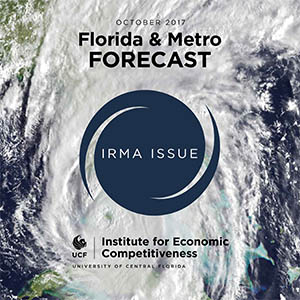ORLANDO — Much of Florida still may be cleaning up after Hurricane Irma, but the Category 4 storm that smacked the Sunshine State in September is no match for Florida’s strong economy, says University of Central Florida economist Sean Snaith.
“The greatest risk to Florida’s economic growth is not Irma, but the political tempest raging in Washington, D.C., that could wash away the prospect for economic stimulus needed to jumpstart the U.S. economy,” Snaith says in the quarterly Florida & Metro Forecast from the UCF Institute for Economic Competitiveness, noting the hurricane’s economic impact will be short lived.

The sectors most impacted by the hurricane in the next two to three months include Leisure & Hospitality (significant short-run job losses will take several months to recoup) and Construction (strong growth will be boosted by repair and rebuilding efforts). Whether President Trump’s administration can enact its proposed tax plan, health care changes and infrastructure spending in the coming months will have a longer lasting impact on Florida’s economy than Irma, Snaith said.
The latest Florida & Metro Forecast shows Florida’s economy, as measured by Real Gross State Product, expanding at an average annual rate of 3.8 percent from 2017 to 2020. In addition, Real Gross State Product will expand by 3.1 percent this year and 4.3 percent in 2018 before easing to 4.2 percent in 2019 and then 3.4 percent in 2020. Average growth during 2017-2020 is expected to be 0.9 percentage points higher than the Institute for Economic Competitiveness’s forecasted average for U.S. Real GDP growth over the same period.
Payroll job growth in the state is robust and continues to outpace national job growth, as year-over-year growth is forecasted to average 2.2 percent from 2017-2020.
“Strong payroll job creation continues to strengthen Florida’s labor market,” Snaith said, “and this strong job market will continue to put more Floridians back on the hunt for employment and attract out-of-state job seekers.”
The forecast shows labor force growth in Florida averaging 2.2 percent from 2017-2020, and Florida’s unemployment rate is expected to level out around 4 percent during the next three years. The sectors expected to have the strongest average job growth during 2017-2020 are Construction (6.5 percent), Professional & Business Services (5.2 percent), Financial (2.4 percent), Leisure & Hospitality (1.7 percent), Education & Health Services (1.7 percent), and Trade, Transportation & Utilities (1.5 percent).
Snaith said housing starts will accelerate going forward, but not fast enough to completely ease the shortage of single-family housing. The hurricane recovery efforts will further squeeze the market for construction labor. Total housing starts are expected to be 117,161 in 2017, 147,638 in 2018, 154,633 in 2019 and 165,312 in 2020. House-price appreciation will decelerate as supply catches up with demand.
In addition, retail sales will grow at an average pace of more than 6.3 percent during 2017-2020—after some short-term, hurricane-related volatility—boosted by a stronger national economy, continued strength in Florida’s labor market and rising household wealth.
Snaith is a national expert in economics, forecasting, market sizing and economic analysis who authors quarterly reports about the state of the economy. Bloomberg News has named Snaith as one of the country’s most accurate forecasters for his predictions about the Federal Reserve’s benchmark interest rate, the Federal Funds rate.
The Institute for Economic Competitiveness strives to provide complete, accurate and timely national, state and regional forecasts and economic analyses. Through these analyses, the institute provides valuable resources to the public and private sectors for informed decision-making.
About UCF College of Business
Established in 1968, the UCF College of Business offers degrees at the bachelor’s, master’s, doctoral, and executive levels. All programs, as well as the Kenneth G. Dixon School of Accounting are accredited by AACSB International – the Association to Advance Collegiate Schools of Business. The college provides high-quality academic programs designed to give students a competitive advantage in the world of business now and in the future.